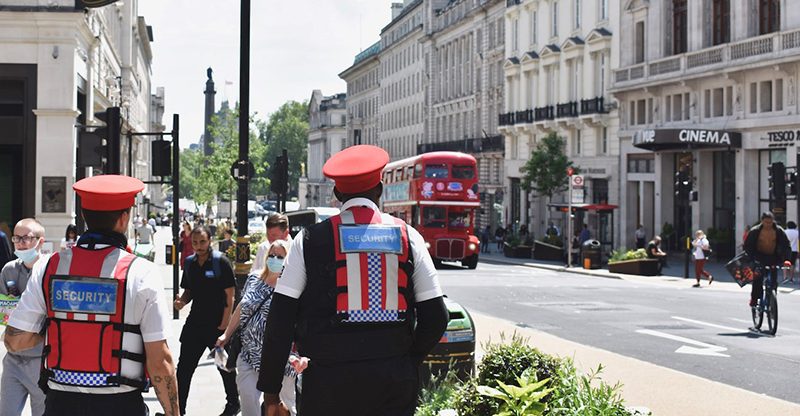Hunter Seymour investigates the new approach from UK Government and its Joint Security and Resilience Centre (JSaRC) to strengthen ties between private security professionals and services, and the public sector. With insight from several contributors, Seymour highlights how state-based initiatives will need to embrace the security sector’s experience and insight – a reality already being showcased in the establishment of the Protect Duty – as well as the challenges in implementing such initiatives.
In response to mounting threats to the UK’s national security, the new head of the British Army General Sir Patrick Sanders warns that Britain is facing its “1937 moment”, recalling the mood when new prime minister Neville Chamberlain reviewed shortcomings in the preparedness of the nation’s defences.
Today, security professionals must get to grips with Homeland Security’s recent initiatives to strengthen Britain’s resilience and security. Implemented by JSaRC (the Joint Security and Resilience Centre), initiatives are dedicated to helping government work more closely with the private sector to meet the challenges of major threats that could endanger the public. In short, an active drive towards joined-up thinking.

Image credit: Bonaventura/AlamyStock
Interconnected national security?
Particularly, JSaRC is committed to encouraging participation in a bottom-up approach, from local community through municipal and civic levels to governmental measures of resilience. As the Cabinet Office Emergency Planning College (EPC) makes clear: “The COVID pandemic and other recent national emergencies have led to questions about how to include the wider community in emergency response and this is being called a ‘whole of society approach’, in a soon to be published UK Resilience Strategy.
The EPC explains further the concept of community resilience: “An increasingly interconnected society and a changing UK risk landscape is also reinforcing the need to join up all parts of society who can make a contribution, while being able to harness the skills and capabilities available.
“The three core principles of the strategy are:
- a shared understanding of the risks we face must underpin everything that we do to prepare for and recover from crises;
- investing in preparation across the risk lifecycle;
- resilience is a ‘whole of society’ endeavour.”
A duty to protect
The motivation for this reevaluation of resilience can be seen as action to enhance existing and ongoing government strategies to increase levels of public security arising from the intensification of terrorist attacks in crowded places, from which the development of a new Protect Duty legislation stems.
Key proponents of the proposed new law, the City Council of Manchester, endorse the provisions outlined in the proposals that seek to establish greater protection from terrorism for the British Public in memory of those victims tragically killed and injured in the terrorist attack at the Manchester Arena in 2017.
The objective of the legislation is to create “a coherent and proportionate approach to protective security. It should apply to any place or space to which the public has access. For small venues this may simply require an addition to their fire plan, for bigger more complex venues it will require a more holistic approach.
“The proposals consist of five requirements. That spaces and places to which the public have access:
- engage with freely available counter terrorism advice and training;
- conduct vulnerability assessments of their operating places and spaces;
- mitigate the risks created by the vulnerabilities identified;
- establish a counter terrorism plan;
- and finally there must be a requirement for local authorities to have plan to meet the threat of terrorism.”
The challenges are identified in plain terms: “The spaces and places in which people live, work and enjoy democratic freedoms are the very places that terrorists wish to attack. They are so numerous, it is unreasonable to expect the state to provide security everywhere.”
Reality check
Niall Griffin CSyP MSyl LCGI MCMI, General Manager of Hardstaff Secure, is very clear on the need for more cohesion in coordinating the expertise of security providers in the private sector. Griffin believes they are a valuable source of informed security advice to event organisers.
He stresses that consultants should offer unbiased advice when providing vulnerabilities assessments and any “product proposal must come before profit” and, if you “don’t make the required product, then recommend someone who does. Remember: One size does not fit all.”
“Whether you’re putting on a 10,000 spectator event or concert, or you’re running a hospitality business that serves 100 people, the recommendations apply equally to both. Obviously, the measures have to be proportionate to the business model.”
Leveraging security sector know-how
On the question of collaborative support of state-based initiatives, the Director of Intelligence Operations, Security and Business Services at Mitie, Barrie Millett, comments: “The JSaRC provides an invaluable platform for government, academia and the private security sector to collaborate on critical security issues. It’s important that JSaRC leverages the vast amount of experience and knowhow that the broader security community possesses in dealing with risks at both local and national level, as this collaborative approach to security will be fundamental in building a more resilient society.

Image credit: My Local Bobby
“Organisations, such as Mitie, that provide security services, are well placed to share the breadth and depth of their expertise, providing JSaRC with intelligence across a broad range of sectors, including Critical National Infrastructure and other organisations that provide essential services.
“During the COVID-19 pandemic, Mitie supported the Government with its national response including establishing Nightingale Hospitals, testing centres, and quarantine hotels – all of which needed to adhere to specific security requirements. It was a testing time globally, and it’s vital that these learnings aren’t lost. We must use this knowledge and experience to establish a ‘whole of society’ security framework designed to effectively manage potential ‘extreme risks’ of the future and JSaRC will be central in this effort.”
Fusion of local resilience strategy – Who can support security professionals?
In the light of this strategic review of policies to protect the nation’s expanding “risk landscape” vulnerable to terrorist attacks, security professionals are urged to consult Counter Terrorism Security Advisers to incorporate counter terrorism awareness training modules such as ACT (Action Counters Terrorism) and SCaN (Check and Notify), into their general crime prevention plans.
At a local level, engagement with local authority Safety Advisory Groups (SAGs) will provide core intelligence for fulfilment of the national strategy’s objectives. Security consultants should seek guidance from their Local Resilience Forum (LRF) to respond to regional strategies as they develop.
LRFs are multi-agency partnerships composed of representatives from local public services, including the emergency services, local authorities, the NHS, the Environment Agency and others such as partners in the military and voluntary sectors. These agencies are known as Category 1 Responders, as defined by the Civil Contingencies Act.
Challenges of public/private partnerships – Costs and liabilities?
“I fully support the ideals put forward by the government but there needs to be a complete change in mindset by the State-based authorities to partnership working. The fact is that private industry or security will likely now be the first on scene at any incident or have access to vital evidence such as CCTV. The initial steps at that scene are vital to protect life and secure evidence. At present there is no joined up approach and a reticence on behalf of some to work together.”
The cost incurred by partnerships between independent security business participants with state sponsored agencies raises inevitable questions of costs.
The “Protect Duty” legal deliberations attempt to address this point: “Where expenditure is required, the UK has a mature and highly experienced security industry able to support any requirement. It is possible that working with a representative body such as ADS (representing Aerospace, Defence, and Security sectors), it may be possible to create an industry led programme with funding being made available to security equipment providers”, rather than to individual event organisers or publicly accessible venues assessed for vulnerabilities.
The majority of contributors to the proposed national Resilience Strategy criteria also recognised funding as a key factor in the ability to deliver emergency preparedness in the UK. The Government also states that a “review of the CCA (Civil Contingencies Act) will carefully consider how the Act can support organisations to use their resources as efficiently as possible.”
In addition, the MD of TM-Eye Private Investigations, ex-Met Detective Chief Inspector David McKelvey, is concerned about the practicalities of such public/private partnerships from a liability perspective.

Head of JSaRC, Angela Essel, at IFSEC International 2019
“I fully support the ideals put forward by the government but there needs to be a complete change in mindset by the State-based authorities to partnership working. The fact is that private industry or security will likely now be the first on scene at any incident or have access to vital evidence such as CCTV. The initial steps at that scene are vital to protect life and secure evidence. At present there is no joined up approach and a reticence on behalf of some to work together.
“It’s equally true that the private sector has taken on a lot of the roles of policing the public realm, where the State based authorities have withdrawn. The State has effectively outsourced the liability to the private sector. The private sector has also taken on the risks and responsibilities that outsourcing entails without the benefits of the safety and security offered to State based agencies.”
Matchmaking between industry and public sector
The threats to the UK’s national infrastructure are increasing. The role of JSaRC, in essence, is to develop a joint response to the UK’s national security challenges, drive and support the delivery of the most effective solutions, and to support the growth of the security sector within the UK and internationally. Put simply, JSaRC is a “matchmaking” service between security industry expertise and public sector demands.
JSaRC’s call for industry innovation and engagement seeks solutions to counter threats in several areas – from terrorism and border security, through to the illegal use of drones and online crime.
Head of JSaRC, Angela Essel, explained at IFSEC 2019: “JSaRC provides a showcase for the security industry to be able to demonstrate their technology and expertise and, from this knowledge-sharing, to shape the market for the types of solution the nation needs. ‘Keeping the public safe’ is JSaRC’s principle mantra and we represent government in partnership with industry in assisting security innovators in navigating government to get their problem-solving innovations to the right places of need.”
Convergence of physical and virtual security
Compounding these new national threats is the ever-present risk of insider threat activities. The convergence of physical and virtual security is the path to solutions, according to experts such as Letitia Emeana of ASIS UK and Unilever. In a recent IFSEC Global podcast, Letitia has valuable advice on the need for a crossover collaborative approach to bridge both disciplines if perfect fulfilment of due diligence in security is to be achieved.

